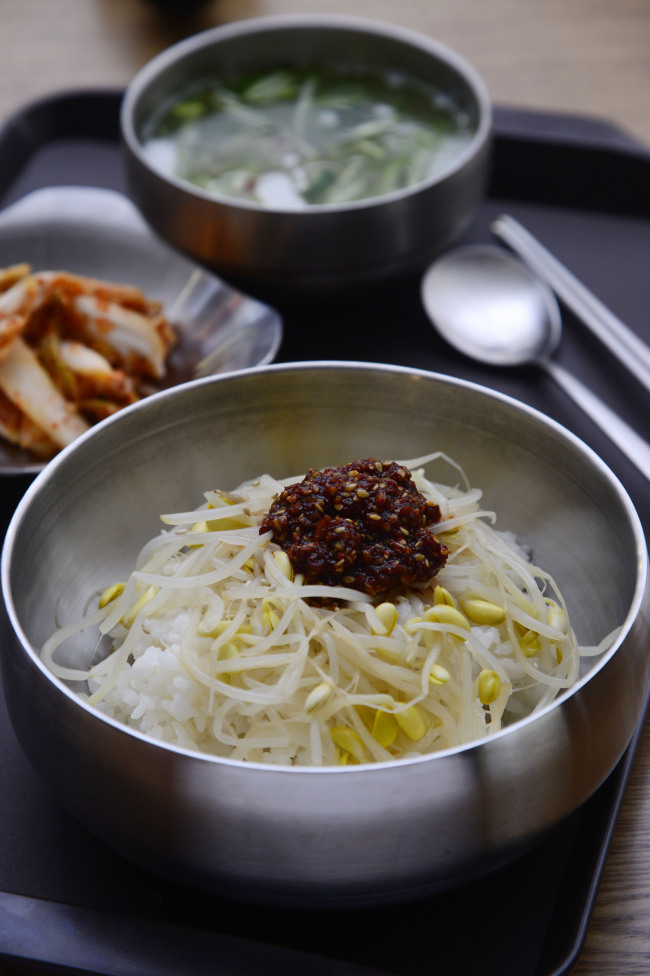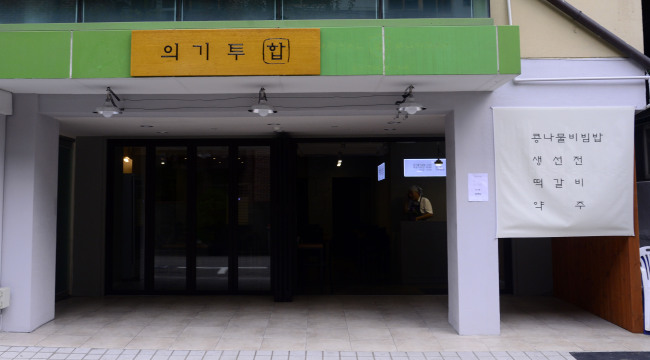Wallet-friendly ‘hansik’ at Uigitu Haap
New eatery serves up bibimbap, tteokgalbi and fish pancakes
By Korea HeraldPublished : Aug. 29, 2014 - 20:00
Haap owner-chef Sin Yong-il, who had been crafting Korean rice cakes and pastries for over three years, knew he would eventually branch out from desserts.
“I wanted to have a casual Korean eatery for a long time,” Sin, 41, revealed.
From his prominent Korean dessert shop, Sin spun out fragrant, spongy makgeolli-infused rice cakes and ginger syrup-filled fried pastries, first at a small spot near Seoul’s Insa-dong and later on from a substantially larger perch in Cheongdam-dong.
As word spread of his talent, Sin stepped into the world of stardom, starring on a cooking show on the cable channel Olive.
There he unveiled his flair for Korean cuisine. Not only could Sin whip up great desserts, he could do everything from soups to vegetable dishes and healthy porridges.
Now, the star dessert master is ready to serve his grub to a real live audience as the executive chef of Uigitu Haap, a restaurant located below Haap that held its reservations-only soft opening last week and will officially open on Sept. 1.
“I wanted to have a casual Korean eatery for a long time,” Sin, 41, revealed.
From his prominent Korean dessert shop, Sin spun out fragrant, spongy makgeolli-infused rice cakes and ginger syrup-filled fried pastries, first at a small spot near Seoul’s Insa-dong and later on from a substantially larger perch in Cheongdam-dong.
As word spread of his talent, Sin stepped into the world of stardom, starring on a cooking show on the cable channel Olive.
There he unveiled his flair for Korean cuisine. Not only could Sin whip up great desserts, he could do everything from soups to vegetable dishes and healthy porridges.
Now, the star dessert master is ready to serve his grub to a real live audience as the executive chef of Uigitu Haap, a restaurant located below Haap that held its reservations-only soft opening last week and will officially open on Sept. 1.

“This is a kongnamul bibimbap restaurant,” Sin said, going on to explain that Uigitu Haap will specialize in bean sprout-centric bibimbap, one of the many classic versions of the Korean dish of mixed greens and rice.
For 6,000 won a pop, diners can dig into a meal featuring the traditional dish of bean sprouts and rice.
The dish is simple yet delicious, a heap of blanched bean sprouts and glistening white rice, which, when mixed with that salty-sweet-nutty dressing of soy sauce, red pepper powder, green onions and sesame seeds, morphs into a sticky, crunchy, perfectly seasoned dish that works well with the spicy cabbage slaw and cold cucumber soup that accompanies it.
The slaw, Sin reveals, is seasoned with pickled shrimp from Tongyeong, adding a “slightly refreshing flavor” to the piquant dish while the summer-appropriate chilled soup gets its sweetness from chamoe (Korean melon).
While Sin refers to Uigitu Haap as a kongnamul bibimbap restaurant, the fish pancakes, tteokgalbi and Korean libations that are also on the menu threaten to steal the show.
The fish pancakes are crafted from live cod that is brought in fresh every morning.
Dredged in a thin layer of flour and then egg before being served up piping hot, each morsel is firm-fleshed and buttery without a trace of fishiness.
The tteokgalbi, says Sin, is made the way he enjoyed it as a child, with a long white rice cake in lieu of the customary bone as the anchor around which the hand-chopped beef, jujubes and chestnuts are molded before being grilled and basted with honey to juicy sweetness.
Then there is Baesangmyun Brewery’s fresh, unpasteurized Sansachun, which is sold at 3,500 won per glass.
Its fermented fizz, potent kick and fruity heat make this tasty Korean wine the perfect foil for those hearty pancakes and tteokgalbi.
Gyeongju Beopju Cheonsu, Baekhwasubok and Chilean red and white wines are also all available for 3,500 won per glass.
Sin also revealed plans to add Hallasan soju to the drinks menu soon.

Uigitu Haap
● 1F, 93-3 Cheongdam-dong, Gangnam-gu, Seoul (02) 511-3792
● Open 11:30 a.m. to 8 p.m. daily, closed Sundays
● Kongnamul bibimbap with cabbage slaw and cucumber soup costs 6,000 won, tteokgalbi (4 pcs) costs 12,000 won (imported beef) and 20,000 won (domestic beef), fish pancakes (6 pcs) costs 12,000 won, half-and-half order of fish pancakes and tteokgalbi costs 12,000 won, Korean alcohol and wine by the glass costs 3,500 won
By Jean Oh (oh_jean@heraldcorp.com)
-
Articles by Korea Herald







![[Hello India] Hyundai Motor vows to boost 'clean mobility' in India](http://res.heraldm.com/phpwas/restmb_idxmake.php?idx=644&simg=/content/image/2024/04/25/20240425050672_0.jpg&u=)











